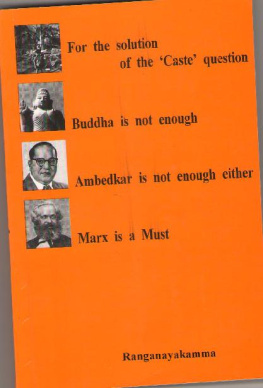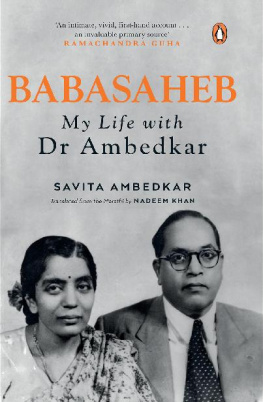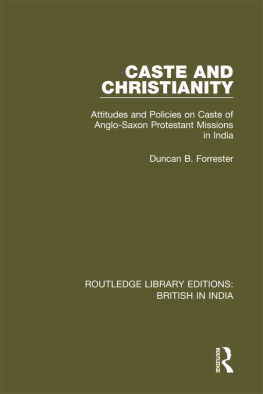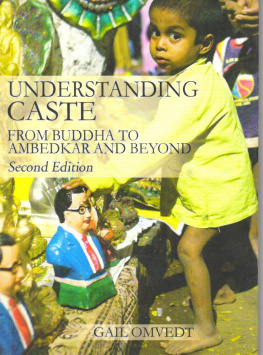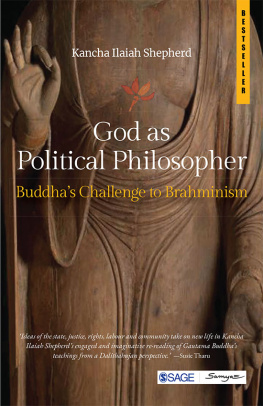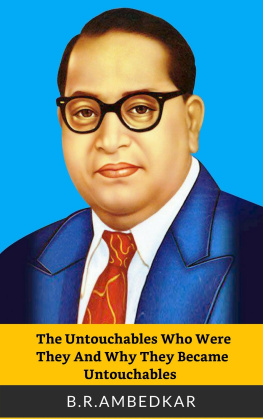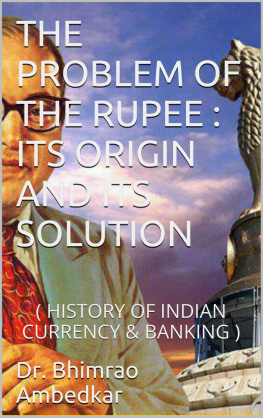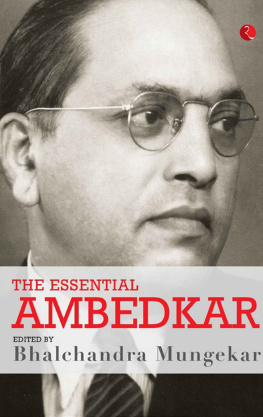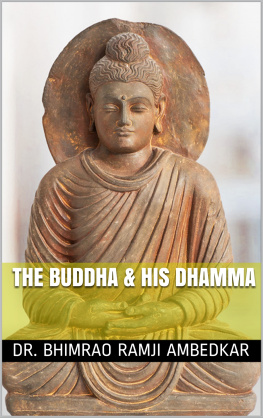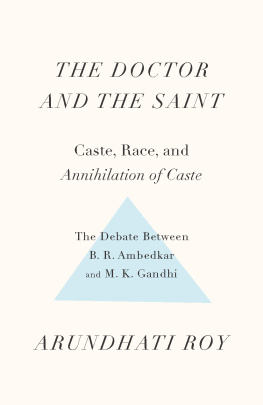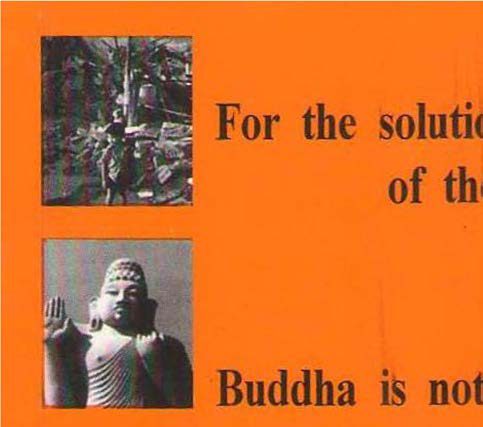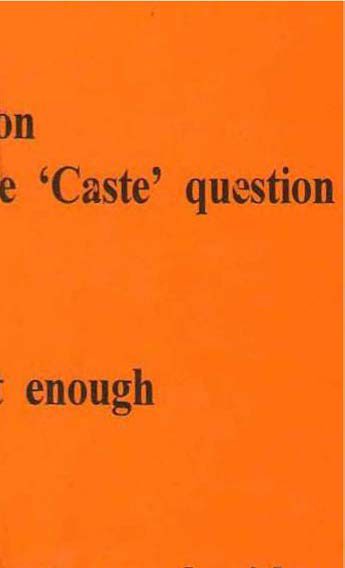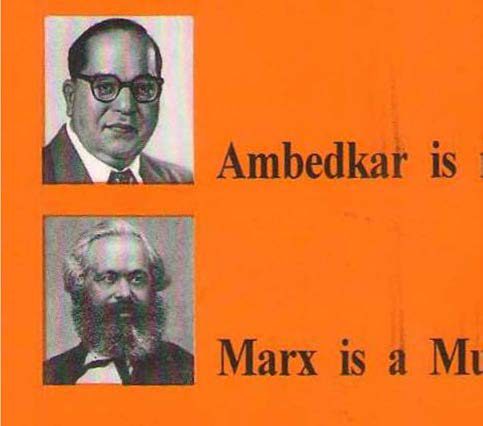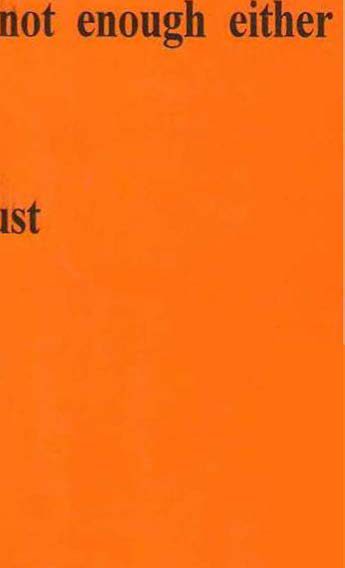Ambedkar is not enough either Marx is a Must
Telugu Original
Ranganayakamma
English Translation B. R. BAPUJI
SWEET HOME PUBLICATIONS
HYDERABAD-500 033
1 (Inner Title)
Ambedkar is not enough either Marx is a Must
By Ranganayakamma
First Published: August, 2001
ISBN: 81-87515-05-8
Price: Rs. : $ :
Published by:
Ranganayakamma,
Sweet Home Publications, 76, Radhika Vihar,
Jubilee Hills post,
Hyderabad-500 033,
Andhra Pradesh, INDIA.
Phone: 040-311 7302.
E-mail addresses:
nranganayakamma@hotmail.com or brbapuji@hotmail.com
Printed at:
Navya Printers
Himayathnagar
Hyderabad - 500 029 Ph: 3223672
2 (Publication details)
Contents
Preface
Translators Note
1. According to Ambedkar,
How did castes originate? ...............................3 1) The Four Varnas 7
2) People imposed castes on themselves! 13
2. According to Ambedkar,
How Shudra Varna came into existence?....28
4) Can the upper Varna exist without a servant Varna? 45
3. Brahminical literature or
Feudal literature?...........................................52
3) Is the poet of Mahabharata truthful
or vainglorious? 61
5. According to Ambedkar,
How did Untouchability begin?....................79
1) All that glitters is not gold!
All that appears to be research is not research! 84
6. According to Ambedkar,
When did Untouchability begin?.................. 87
7. Do you want Untouchability or slavery?...96
8. Hindu reformers on Untouchability...........104
1) Vivekananda 105
2) Gandhi 109
3) Radhakrishnan 110
4) Reformist Organisations 112
9. Beware of Mahatmas!..................................113
1) Beginning of efforts for Reservations 115
2) Beware of Deputy Mahatmas! 126
3) More on Mahatma! 131
(1) Once again on Gandhi 132
(2) Mr. Gandhis Harijan Sevak Sangh 133
10. The condition of Untouchables......................140
11. Some Dalit Movements................................148 1) Struggle for using roads 149
2) The case of the Chawdar Tank 149
3) Burning of Manu Smriti 151
4) Struggle for entry into Kalaram temple 151 5) Refusal to do unclean work 152
6) Demands of Dalits 155
12. Not only Division of Labour,
But also Division of Labourers
Is found in all countries..................................158 1) Some comments of Ambedkar on Caste system 163
13. What did Ambedkar say in
Annihilation of Caste........................164 1) How to reform the Hindu religion 165
2) Is fusion of sub-castes mischievous? 168 3) Is annihilation of caste impossible? 173
(1) Who are Intellectuals? 174
(2) Does any caste not like to change? 176
14. According to Ambedkar,
Protection against Economic
Exploitation!......................183
1) Ambedkars State Capitalism 196
2) What is the difference between
Gandhi and Ambedkar concerning Property? 197
3) The Ideal society that Ambedkar cherishes! 201
15. According to Ambedkar,
What is Buddhism?........................................ 202 1) Buddhas Birth and Renunciation 203
2) Stories that defame Buddha! 212
3) This is the Enlightenment which
Buddha obtained! 223
4) Purity, Righteousness and Virtue! 231
5) Will Buddhas path remove suffering? 236
6) Does Rationalism apply only to nature? 240
7) Disciples begin to join 246
8) The life of Sanyasi is a life based on
exploitation of labour 246
9) Disciples intoxicated with wealth 247 10) The poor disciples 253
11) Nothing is our own except slaves! 256 12) Aha! How comfortable this renunciation is! 257 13) Signs of a great being in Buddha 258 14) Why should a leprosy patient live? 260 15) Does Buddha do magic? 260
16) Feast after Feast! Gift after Gift! 261
17) Quarrels among monasteries for properties 264 18) Criticism against Buddha 265
(1) Is Buddha a parasite? 265
(2) On Buddhas Ahimsa (Non-Violence) 268 19) Ahimsa in the case of food! 270
20) Barren Metaphysics of Buddha 273
21) For whom is it possible? 279
22) What does Buddha say about property? 279 23) A good story 283
24) Good Sermons 284
25) What did Buddhism do for Shudras? 286 26) What did Buddhism do for women? 287 27) Buddha visits home and returns 290
28) Essence of Buddhism 291
29) The Buddha breathed his last 294
16. Ambedkar on Marxism..................................297 1) Buddha or Karl Marx?: the essay begins! 297 2) According to Ambedkar, Marxism is useless! 299
(1) The Creed of the Buddha 299
(2) Marxs theory 301
3) Buddha had already said all that Marx said! 308 4) Whose path is better? 314
(1) Buddhas means to achieve Communism 315
(2) Marxs means to achieve Communism 319 4) According to Ambedkar,
Communism is a pig philosophy 337
5) A letter that someone wrote to someone else! 350 6) A justified doubt of Ambedkar 351
17. Ambedkars own Economics......................... 355 1) What is the aim of the political power of Dalits? 359
18. Role of Ambedkar in
Drafting the Constitution.............................364 1) This Constitution is a grand structure of
political democracy: Ambedkar 376
2) Military in Telangana 387
3) Break with Congress 394
4) I will be the first person
to burn this Constitution: Ambedkar 395
19. Ambedkar has changed religion.................398
20. What, then, is Ambedkar?.............................405 The Blunt weapon of Untouchability!..........418
Preface
To the first Telugu edition
T his is neither Buddhas biography nor Ambedkars. Further, it is not Marxs biography either. This is a discussion concerning the Dalit question based exclusively on Ambedkars writings. However, I have confined myself only to those writings that deal with the Dalit question and Caste system. Ambedkar had also discussed other issues like Division of labour, Division of Labourers, poverty, unemployment and economic exploitation. These issues are connected with the Dalit question and the Caste system. Hence all these issues find place in this book.
Ambedkar had also written on other themes like the Problem of the Rupee and Large Scale Industry. But I have not included those issues which are not directly connected with the Dalit question. Even regarding Gandhi, I have not considered issues other than those Ambedkar cited in connection with the Dalit question.
For the purpose of this essay, I wanted to rely only on Ambedkars writings. But, in couple of contexts where I could not find relevant information in Ambedkars works, I had to turn to a few references from his biographies. I have given these details in the respective contexts.

